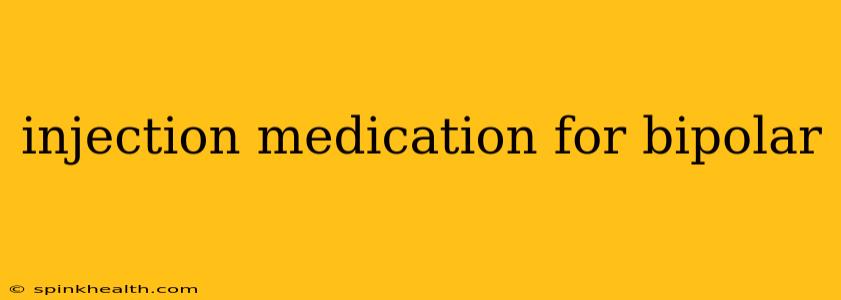Bipolar disorder, a chronic mental illness marked by extreme mood swings, can significantly impact a person's life. While various treatments exist, injectable medications are increasingly playing a vital role in managing the condition, particularly for those who haven't found success with oral medications or require a faster-acting treatment. This comprehensive guide explores the landscape of injection medications for bipolar disorder, addressing common questions and concerns.
What are the different types of injection medications for bipolar disorder?
Several injectable medications are used to treat different aspects of bipolar disorder, primarily focusing on managing manic and depressive episodes. These fall into two main categories: antipsychotics and mood stabilizers.
Antipsychotics: These medications are often used to address the acute symptoms of mania, such as racing thoughts, impulsivity, and psychosis. Injectable forms can provide rapid symptom relief, especially during severe episodes. Examples include:
- Aripiprazole (Abilify Maintena): This long-acting injectable is administered monthly and helps prevent relapse.
- Risperidone (Risperdal Consta): Another long-acting injectable, given every two weeks, that's commonly used for managing mania and maintaining stability.
- Paliperidone palmitate (Invega Sustenna, Invega Trinza): These are long-acting injectables with varying administration schedules (monthly or every three months).
Mood Stabilizers: While not all mood stabilizers have injectable forms, some are administered via injection for rapid symptom management during acute episodes. This is often used in conjunction with oral medication to maintain long-term stability. One example is:
- Lithium: Although primarily administered orally, lithium can be given intravenously in emergency situations to rapidly stabilize severe mania or depression.
It's crucial to understand that these are just examples, and a doctor will determine the most appropriate medication based on individual needs and medical history.
What are the advantages of using injection medication for bipolar disorder?
Injectable medications offer several advantages compared to oral medications:
- Improved adherence: For individuals struggling with medication adherence, injections offer a convenient and consistent delivery method. Forgetting a daily pill is less of a concern with scheduled injections.
- Faster symptom relief: Injections, especially in acute situations, can provide faster symptom relief than oral medications, which can take time to reach therapeutic levels.
- Reduced side effects (in some cases): While side effects can still occur, some individuals find that injectable formulations cause fewer side effects than their oral counterparts.
- Long-acting formulations: Long-acting injectable antipsychotics allow for less frequent administration, promoting better adherence and simplifying treatment management.
Are there any side effects associated with injection medication for bipolar disorder?
As with all medications, injectable medications for bipolar disorder can have side effects. These can vary depending on the specific medication and the individual. Common side effects might include:
- Injection site reactions: Pain, swelling, or redness at the injection site.
- Weight gain: Some antipsychotics can contribute to weight gain.
- Metabolic changes: Changes in blood sugar and cholesterol levels.
- Sedation or drowsiness: This is common with many antipsychotics.
- Extrapyramidal symptoms (EPS): These involve movement disorders and are more common with certain antipsychotics.
It's crucial to discuss potential side effects with a healthcare professional before starting any medication. They can help manage side effects and adjust the treatment plan if needed.
How are injection medications administered?
Injectable medications are typically administered by a healthcare professional in a clinical setting. The frequency of injections varies depending on the specific medication. Some are administered weekly, bi-weekly, monthly, or even every three months. The administration site is usually the muscle (intramuscular injection).
What are the long-term effects of injection medication for bipolar disorder?
Long-term effects depend on the individual's response to the medication and the presence of any side effects. Regular monitoring and adjustments by a healthcare professional are crucial for long-term management. With effective treatment, the goal is to reduce the frequency and severity of mood episodes and improve overall quality of life. However, individuals should be aware that ongoing treatment and monitoring are typically necessary to maintain stability.
Are there any alternatives to injection medication for bipolar disorder?
Yes, many other treatment options exist for bipolar disorder, including:
- Oral medications: This is the most common method of treatment, encompassing mood stabilizers, antipsychotics, and antidepressants.
- Psychotherapy: Cognitive behavioral therapy (CBT) and other forms of therapy can help individuals develop coping mechanisms and manage their condition.
- Lifestyle changes: A balanced diet, regular exercise, and adequate sleep are essential components of effective bipolar disorder management.
Remember, this information is for educational purposes only and should not be considered medical advice. Always consult with a healthcare professional to discuss the best treatment plan for your specific situation. They can assess your individual needs, medical history, and preferences to determine the most appropriate approach for managing your bipolar disorder.

